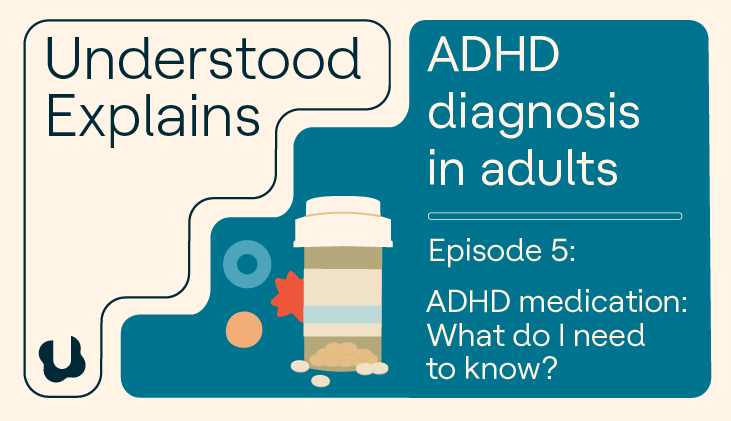Stay in the know
All our latest podcasts delivered right to your inbox.
How does ADHD medication work? Is it addictive? If you think you might have ADHD or were recently diagnosed, find out what you need to know about medication, like how to tell if you’re taking too much or too little. Get answers to common questions:
How does ADHD medication work? [00:51]
Does everyone with ADHD need medication? [03:39]
How can medication help manage ADHD symptoms? [04:21]
What are the limitations of ADHD medication? [06:05]
Is ADHD medication addictive? [06:50]
Will ADHD medication turn me into a zombie? [08:26]
How can I tell if I’m not taking enough ADHD medication? [09:41]
What do I need to know about possible side effects of ADHD medication? [10:31]
Key takeaway, next episode, and credits [12:25]
Related resources
Episode transcript
You’re listening to Season 2 of Understood Explains: ADHD Diagnosis in Adults.
Today’s episode answers the question “What do I need to know if I’m thinking about starting to take ADHD medication?”
My name is Dr. Roberto Olivardia, and I’m a clinical psychologist with more than 20 years of experience evaluating people for things like ADHD. I’m also one of the millions of people who have been diagnosed with ADHD as an adult. I’ll be your host.
My goal here is to answer the most common questions about ADHD diagnosis. Along the way, you’ll learn a lot about ADHD in general.
We’re going to do this quickly — in the next 10 or so minutes. So, let’s get to it.
How does ADHD medication work? [00:51]
Before we dive into this topic, I want to make clear that I’m a psychologist, which means I can’t prescribe medication. Psychiatrists can prescribe, but in most states, psychologists can’t.
Also, I want to be super clear that I don’t get paid by pharmaceutical companies to promote ADHD medication. I’m just here today to explain a few things so you can talk with your doctor and decide what’s best for you.
OK, so how do ADHD meds work? There are two big things to know here:
The first is that ADHD makes it harder for your brain cells to send messages to each other.
The second thing to know is that medication helps the ADHD brain function more efficiently. It can level the playing field for people with ADHD. But it’s not going to be a huge performance enhancer for people who don’t have ADHD.
So what do I mean by “level the playing field”? To explain this in a bit more detail, I’m going to use a baseball analogy. I want you to picture two brain cells. One is the pitcher and the other is the catcher. And the balls are the brain chemicals, which are called neurotransmitters, that get passed from one brain cell to the next.
There are three ways that ADHD can affect your brain chemistry:
For starters, maybe the pitcher isn’t throwing enough balls to the catcher. This is my nontechnical way of saying maybe there aren’t enough neurotransmitters being released to pass the information along to the next cell.
The second kind of brain chemistry problem is that ADHD can make it harder for the catcher to catch the ball. Maybe the ball keeps falling out of the catcher’s mitt. (The mitts are what biologists call receptors. This part of a cell is really important for everything from developing an effective COVID vaccine, to remembering where you left your house keys.)
And the third type of brain chemistry problem is that maybe the pitcher keeps snatching the balls off the ground before the catcher can grab them. The pitcher needs to collect the unused balls eventually — this is called reuptake. And reuptake is important because without it, the pitchers won’t have any balls left to throw. But retrieving the balls too quickly can mean the catcher doesn’t get much of a chance to catch them.
So how can ADHD meds help brain cells work together more efficiently? Bear with me — more baseball. 😀
ADHD medication can help release more neurotransmitters — it can help the pitcher throw more balls.
Medication can also stimulate the receptors so they can catch more of the neurotransmitters — it’s almost like putting something sticky in the catcher’s mitt.
And some types of ADHD medication have a daunting name: reuptake inhibitors. But all this means is that they’re slowing down the pitcher’s ball retrieval to give the catcher more time to catch.
Does everyone with ADHD need medication? [03:39]
The short answer is no. Getting an ADHD diagnosis does not mean you have to start taking meds. In fact, the whole next episode of this podcast is about non-medication treatments for ADHD.
But for this episode, I want to go over what medication can and can’t do, how it affects your body, and why it’s so important to work closely with your provider to do things like fine-tune the dosage.
And I’m going to tailor this information for two very different groups of people: those who are really eager to take ADHD meds, and those who are really leery of taking them.
How can medication help manage ADHD symptoms? [04:21]
Medication can be extremely helpful to many people with ADHD, especially for folks who are diagnosed as having moderate to severe symptoms.
I’ve seen medications have dramatic positive effects for my patients in so many different ways.
One patient, who is an attorney, said that before he was diagnosed and treated for ADHD, he could only read for maybe 10 or 15 minutes before getting distracted.
It would take him hours and hours to get through legal briefs, which impacted his sleep and led him to drink a lot of caffeine, which resulted in some health problems.
Once he took medication, he was elated to report that he could focus on a legal brief for a few hours at a time, and only needed a quick break or two to stretch his legs! This was life-changing — not only for his reading productivity but also treating the cascade of other issues that came with that.
A good way to think about medication is that it can be one of many tools in your toolbox to help you cope with challenges.
And speaking of tools in the toolbox, I want to say a quick word about a common concern that taking ADHD meds is somehow like “cheating.”
I know a lot of folks with ADHD are hesitant to take meds because they think they should just be able to manage their symptoms on their own.
But would you feel the same way if we were talking about medication to treat your diabetes or high blood pressure? Sure, you could be very careful about what you’re eating and change other aspects of your daily routine. But if taking insulin helps your body function better, you wouldn’t call that cheating, would you?
ADHD medication isn’t cheating, either. It’s just one of many ways you can help manage your ADHD.
What are the limitations of ADHD medication? [06:05]
Despite all the great things it can do….
ADHD medication is not a cure-all.
It can help alleviate ADHD symptoms, but it’s not going to magically solve all your problems with, say, getting organized or planning things.
Remember: Pills don’t teach skills.
ADHD meds are also not very helpful to people who don’t have ADHD.
You might have heard that ADHD meds are “performance enhancers,” but they don’t have nearly as big an effect on people who don’t have ADHD. The medication might help them stay awake so they can pull an all-nighter, but it’s not going to help increase their memory or learning.
Is ADHD medication addictive? [06:50]
This is an especially important topic to discuss, because people with ADHD are at greater risk for addictive behavior in general. We know that a lot of teens and adults with untreated ADHD try to self-medicate with drugs and alcohol.
But, interestingly enough, research has shown that, if you have ADHD and are getting properly treated for it, taking ADHD meds appears to reduce the risk of substance abuse, not increase it.
Studies show that people with ADHD who respond well to medication are less likely to abuse alcohol and drugs. One theory is that the medication helps them feel more in control of their lives so they feel less of a need to self-medicate.
Medication treatment is also associated with lower relapse rates in people with ADHD who are in recovery for drug or alcohol addiction.
That’s because ADHD meds help with impulse control, emotional regulation, and — just in general — getting important stuff done, which leads to more success and higher self-esteem.
I also want to mention that people who don’t actually have ADHD are more likely to get addicted than people who do have it. This may be because people who are using ADHD meds recreationally are more likely to take a lot at once to get high than to take just enough each day to boost their concentration.
Bottom line: The risk of getting addicted to ADHD medication is very, very low if you have ADHD and if you’re using your medication as prescribed.
Will ADHD medication turn me into a zombie? [08:26]
This is a common misconception. But it’s based on something that happens all too often, which is that if the dose is too high, the meds can make you feel “off.”
This is one reason why it’s incredibly important that — if you decide to start taking ADHD medication — you need to partner with your prescriber to find the right medication and the right dosage that is tailored just for you.
And finding the best fit for you can be a bit of a trial-and-error process. Your prescriber may want you to spend some time trying a certain drug at a certain dose before making adjustments.
Some of the signs your dosage may be too high include:
Not quite “feeling like yourself”
Never getting hungry
Feeling “wired” and irritable for most of the day, or
Having a lot of trouble falling asleep most nights
Be sure to tell your prescriber if you’re feeling these kinds of things.
And since it can be hard to remember everything, it’s a good idea to keep a journal or use a medication log to help you and your prescriber look for patterns. We’ll put a link in the show notes to a medication log that the Understood.org team put together.
How can I tell if I’m not taking enough ADHD medication? [09:41]
As I mentioned a minute ago, finding the right dosage can be a trial-and-error process. The same dose might affect you very differently than another person — even if you’re the same height or weight.
Your ADHD medication might be wearing off too soon if you feel OK in the morning but you feel really sad or tired in the evening. Or if your ability to focus seems to wear off early in the afternoon.
These aren’t necessarily signs you need a higher dosage. But you may need a longer-lasting medicine or a small “booster dose” of short-acting medicine. This is yet another reason why — if you decide to start taking ADHD medication — it’s essential to work with your prescriber to help find what works best for you.
What do I need to know about possible side effects of ADHD medication? [10:31]
So, there are two kinds of ADHD meds — stimulants and non-stimulants — and they can have different side effects.
First, let’s talk about stimulants. This is the kind of ADHD medication that prescribers are most likely to start off with. It’s also the kind that is more likely to get used or abused recreationally. Commonly prescribed stimulants include Ritalin, Adderall, and Concerta. And by the way, these are the brand names, but they all have generics that are cheaper.
Potential side effects of stimulant medications include:
Trouble sleeping
Decreased appetite
Weight loss
Increased blood pressure
Dizziness
Headaches and stomachaches, and
Feeling moody, irritable, or nervous
Non-stimulants are often used when people don’t respond to stimulants or experience side effects from them. These meds include Strattera, Tenex, Intuniv, and Kapvay. They all have cheaper, generic versions too.
Possible side effects of non-stimulants include:
Nausea
Stomachaches
Decreased appetite
Weight loss
Fatigue
Drowsiness, and
Mood swings
In addition to adjusting your dose or medication, your prescriber may also suggest making certain changes at home, like changing when you take your meds… or eat your meals… or start your bedtime routine.
With the right fine-tuning, many people may experience little or no side effects from their ADHD medication.
Also, it’s really important to tell your prescriber if you’re taking any other medications — even over-the-counter supplements — because these things might impact your ADHD medication.
And last but not least, keep in mind that your medication needs may change as you get older. So even if you get to the point where your routine is working really well, stay in touch with your prescriber, because you may need to adjust things down the road.
Key takeaway, next episode, and credits [12:25]
OK, listeners, that’s it for Episode 5. The key takeaway I’m hoping sticks with you from this episode is…
Medication can be a game-changer for many people with ADHD. The key is to work closely with your prescriber, keeping track of any side effects and taking time to fine-tune things like dosage, time of day, whether you’re taking instant- or extended-release. The first medication you try could work well, or it may take several more trials. But your health and well-being are worth it.
Thanks for listening. And now that we’ve covered some important things to consider if you’re thinking about starting to take ADHD medication, I hope you’ll join me for Episode 6, which explains non-medication treatments for ADHD.
You’ve been listening to Season 2 of Understood Explains from the Understood Podcast Network. If you want to learn more about the topics we covered today, check out the show notes for this episode. We include more resources, as well as links to anything we’ve mentioned in the episode.
One important note: I don’t prescribe ADHD medication and I don’t have any affiliation with pharmaceutical companies — and neither does Understood. This podcast is intended solely for informational purposes and is not a substitute for a professional diagnosis or for medical advice or treatment. Talk with your health care provider before making any medical decisions.
Understood Explains is produced by Julie Rawe and Cody Nelson, who also edited the show. Briana Berry is our production director. Our theme music was written by Justin D. Wright, who also mixes the show.
For the Understood Podcast Network, Laura Key is our editorial director, Scott Cocchiere is our creative director, and Seth Melnick is our executive producer.
Understood is a nonprofit organization dedicated to helping people who learn and think differently discover their potential and thrive. Learn more at understood.org/mission.
Host
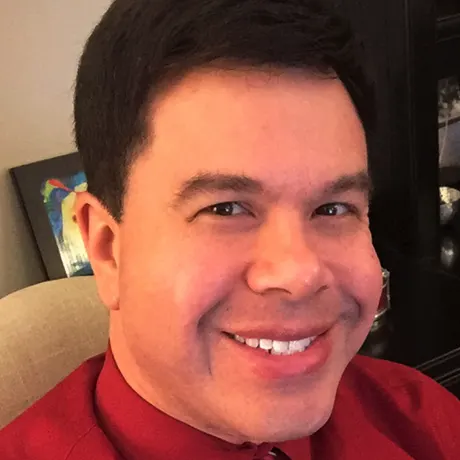
Roberto Olivardia, PhD
is an expert in the treatment of ADHD, obsessive-compulsive disorder, and body dysmorphic disorder. He also focuses on issues facing students with learning disabilities.
Latest episodes

March 22, 2023
Listen to the trailer for Season 2 of “Understood Explains,” which explains ADHD diagnosis in adults — from getting tested to finding support.
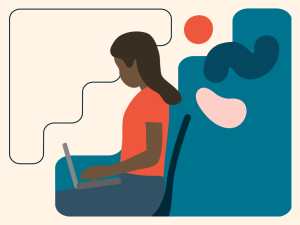
March 29, 2023
Wondering if you have enough ADHD symptoms? If it’s worth the effort to get tested? Host Dr. Roberto Olivardia shares his own adult diagnosis story.

March 29, 2023
Find out which types of health care providers can diagnose ADHD in adults — if it’s worth the wait to see a certain kind of specialist.

March 29, 2023
Find out how doctors test adults for ADHD. What kind of questions do they ask? How long does it take? Know what to expect in a thorough evaluation.
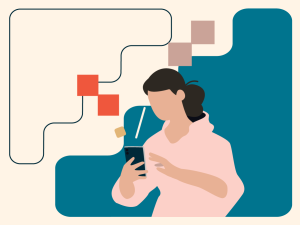
March 29, 2023
The wait time may be shorter, but is online diagnosis accurate? And can it help you get ADHD treatment? Learn the pros and cons of online testing.

March 29, 2023
There are many ways to treat ADHD without medication or in addition to medication. Learn about options ranging from behavior therapy to free apps.
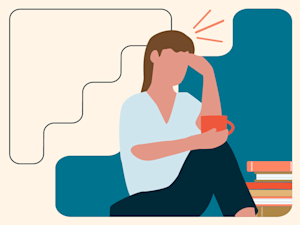
March 29, 2023
Relief. Anger. Grief. Learn about common reactions to getting diagnosed with ADHD and how to process these feelings so you can keep moving forward.
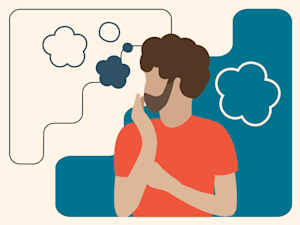
March 29, 2023
Doubting the accuracy of your ADHD diagnosis? Find out how to tell if you got a thorough evaluation and if you might need a second opinion.

March 29, 2023
Listen to personal stories about adult ADHD diagnosis. Find out what led each person to get diagnosed and what they wish they’d known sooner.
